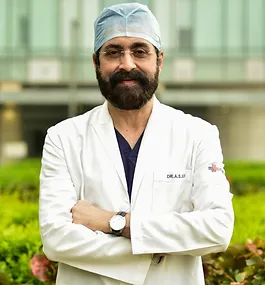A liver transplant is not the end of the journey. In many ways, it is the beginning.
Surgeons can replace a failing liver with a healthy one, but your own body may not accept this “gift” easily. That is where immunosuppressant therapy comes in — a quiet, behind-the-scenes protector that makes sure the new liver can do its job.
Most people think of transplant as just a surgical success story. What often gets missed is this:
Without the right medicines after the transplant, even the perfect surgery can fail.
Table of Contents
ToggleIt’s Not Just About Preventing Rejection
One mistake people make is to think immunosuppressants are only to stop rejection. But the story is deeper.
- They help control the balance between immune system aggression and tolerance.
- They reduce inflammation, which otherwise can scar the liver slowly.
- They also influence how other organs like kidneys and heart cope after the surgery.
It’s not like you just switch off immunity fully. Doctors play with doses, combinations, timings to keep just the right level – enough immunity to fight infections, but not so much that liver that the liver gets attacked. It is like walking on a thin rope.
But, Why Your Body Attacks What Saves You
Our immune system is designed to protect us — to fight anything “foreign,” like viruses or bacteria. But it cannot tell the difference between a harmful invader and a life-saving donated liver.
Think of it like a very strict security guard who sees a new face and assumes it’s a threat.
The immune system launches an attack on the transplanted liver — this is called rejection.
Here’s the twist:
- Rejection isn’t rare. It can happen even months or years after surgery.
- You won’t always feel symptoms in the early stages. By the time jaundice, fever, or fatigue appear, damage may already be serious.
- Once rejection takes hold, reversing it is extremely difficult.
This is why immunosuppressants are not optional. They keep that overzealous “security guard” calm, so your new liver can settle in and work normally.
Immunosuppressants Are Not Just Medicines — They Are a Lifeline
After a liver transplant, people often focus on wound healing, lab reports, and diet. The medicines they swallow every day feel like just another routine. But immunosuppressants are different.
- Skip one dose, and your body may quietly start rejecting the liver.
- Stop them for a week, and the risk of irreversible damage shoots up.
- Even minor changes — like switching brands without medical guidance — can upset the delicate balance.
These medicines don’t heal the liver directly. Instead, they create the safe environment needed for your transplanted liver to thrive.
The Balancing Act: Not Too Much, Not Too Little
Here’s the tricky part.
Immunosuppressants must dampen your immune system just enough to prevent rejection — but not so much that your body can’t fight infections.
Doctors carefully adjust doses, sometimes weekly or monthly, based on blood tests. This isn’t over-caution. Every person’s body reacts differently, and too high a dose can open doors to other problems like:
- Serious infections, even from common germs.
- Kidney stress, especially with certain drugs.
- Diabetes or hypertension, as side effects over time.
- Increased risk of certain cancers, because the immune system is weakened.
It’s a tightrope walk. That’s why transplant follow-ups never really “end.”
Why Stopping Medicines Is So Dangerous
Some people, months or years after surgery, start feeling completely fine.
They think:
“If I’m healthy now, maybe I don’t need these strong medicines anymore.”
This is one of the biggest risks in post-transplant care. Feeling well does not mean the immune system has accepted the liver forever.
Rejection can strike silently, and by the time symptoms show up, the liver may already be failing.
Doctors sometimes meet patients who stopped their drugs on their own — often due to side effects, cost, or simple misunderstanding — and now need a second transplant. Sadly, the chances of success are lower the second time.
Different Drugs, Different Roles
There isn’t a single magic pill. Post-transplant therapy usually involves a combination of medicines, each with a specific role:
- Calcineurin inhibitors — the backbone of therapy.
- Steroids to control inflammation, especially in the early months.
- Anti-proliferative agents, to provide extra protection when risk is high.
The exact mix changes over time. In the first year, doses are higher because the rejection risk is greatest. As the body stabilizes, doses may be reduced — but rarely stopped completely.
The Hidden Everyday Challenges
Honestly, taking immunosuppressants is not just about swallowing pills.
There are everyday challenges most outsiders don’t see:
- Dealing with side effects. Weight gain, hair changes, blood pressure issues, sugar going up, kidney stress, risk of infections – the list is long.
- Timing is everything. Many drugs must be taken at the exact same time every day. Even a two-hour delay can affect blood levels.
- Food interactions. Some medicines don’t mix well with certain foods like grapefruit, or even herbal remedies.
- Constant lab tests. Regular blood checks aren’t “extra cautious” — they are essential to avoid silent rejection or drug toxicity.
- Mental strain. Knowing you can never stop these medicines can feel overwhelming. Some people need counseling to cope with this lifelong commitment.
Patients and families need to understand not just “take this pill” but “why this pill is keeping your liver alive.”
Cost Factor: Reality Nobody Likes to Discuss
Immunosuppressants are expensive. In many countries, government does not always cover them lifelong. Some people struggle every month to arrange money. That financial stress itself is a health problem. Because of that, patients sometimes reduce dose quietly without telling doctor.
Doctors also know this but often they are helpless because alternative cheaper drugs may not suit every patient. Some hospitals now try to create patient-support groups where people can pool resources or get access to generic versions. But still, this remains a serious challenge.
So, when we say “critical,” it’s not only medically critical but also socially and economically. Without affordable access, many transplants fail not because of science but because of simple pocket issues.
Why It’s About More Than Just You
Liver transplant care is a team effort — and not just between you and your doctor.
Family members, caregivers, even friends play a role. Why? Because staying consistent with medicines is harder than it sounds.
- A missed dose may happen because someone forgot to refill a prescription.
- Travel or work stress can disrupt routines.
- In some cases, patients feel embarrassed taking medicines in public and delay them.
Having a support system helps maintain strict adherence, which directly impacts how long the transplanted liver lasts.
Let’s take a closer look on how family plays major role:
- Someone needs to track medicine stock.
- Someone needs to remind remember doses, especially if patient if the patient is elderly or child or a child.
- Emotional support is important because patients can feel trapped in “lifelong medicine jail.”
- Family Families should also watch for early signs of infection or side effects.
Transplant is a team sport. Without family cooperation, patient patients can’t manage it alone for decades.
The Long View: Living Well With a Transplanted Liver
A liver transplant can last decades — even a lifetime — if rejection is prevented.
Immunosuppressant therapy is the key to making that happen.
Here’s what patients who do well long-term usually have in common:
- They never stop medicines taking medicine on their own, no matter how good they feel.
- They follow strict follow a strict routine. They fix time for medicines, do not change it daily.
- They attend every follow-up, even years after surgery.
- They do regular blood tests. Even if they feel healthy, these tests may show what’s happening inside.
- They speak openly with their doctor about side effects instead of quietly adjusting doses or switching drugs.
- They maintain a healthy lifestyle, which reduces the extra burden on their liver and kidneys.
- They don’t mix with random supplements. Some herbal or over-the-counter medicines interfere with immunosuppressants. They always ask doctor ask the doctor.
Myth Buster: It’s Not Just About “Strong Medicines”
Some people believe immunosuppressants are simply “strong drugs that keep your immune system weak.”
That’s only half the story.
Modern transplant medicine has advanced enormously. Today’s drugs are targeted and carefully monitored, designed to keep you protected while minimizing harm.
The goal isn’t to “switch off” your immunity but to fine-tune it — like adjusting the volume on a speaker rather than cutting the power completely.
Why Skipping Follow-Ups Is Like Driving Blind
Blood tests after a liver transplant are not routine checkboxes.
They are early warning systems. Even before symptoms appear, certain liver enzymes or drug levels in your blood can reveal trouble brewing.
When patients miss appointments, doctors lose that window to act early.
By the time a problem is visible on the outside — yellowing skin, swelling, fatigue — it may already be too late.
The Future: Hope for Fewer Medicines
Researchers are exploring ways to train the immune system to accept transplanted organs naturally, reducing the need for lifelong drugs.
Some experimental protocols aim for “tolerance,” where after a few years, medicines can be safely reduced or stopped.
But for now, these are experimental and not routine. Until proven safe and reliable, daily immunosuppressants remain essential.
Final Thoughts
A liver transplant is one of the most remarkable medical achievements of our time. But the surgery is only half the battle.
Immunosuppressant therapy is what turns a temporary success into a lasting second chance at life.
It’s easy to underestimate the importance of those pills, especially when you feel healthy.
But remember:
The real danger isn’t what you can see — it’s what happens quietly inside, when your immune system decides to fight the very organ that saved you.
ovo88
Take every dose. Ask every question. Never miss a follow-up.
Your new liver depends on it — and so does your future. https://govisumber.cfga.gov.mn/








